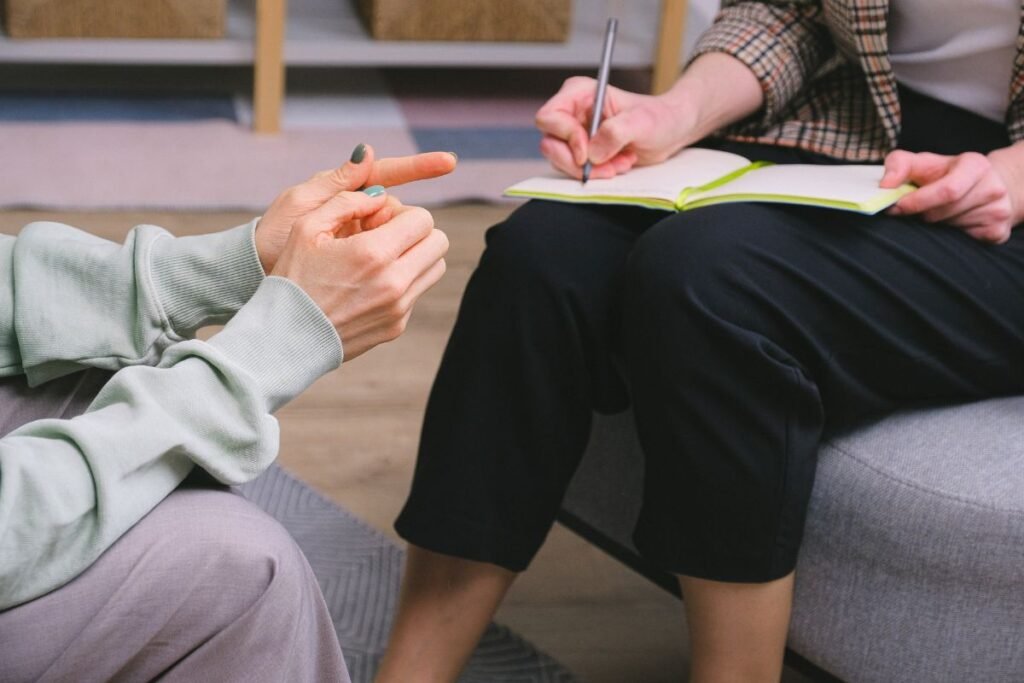Finding the right therapist is a lot like finding the right pair of shoes—you want them to fit comfortably, provide support, and make you feel like you can keep moving forward. But just like with shoes, not every therapist might be right for you, and that’s okay! The process of finding someone you can trust and open up to can take some time, but it’s worth it. Therapy is deeply personal, so finding the right therapist to accompany you in your healing journey can make the difference.
If you’re just starting out or you’ve tried therapy before and didn’t quite “click,” here are our top tips to help you find the right therapist.
Know What You’re Looking For
Before diving into your search, take a moment to reflect on what you need. Grab a pen and a paper and write down some criteria that will help you narrowing down your search. Start by writing down what kind of support you are looking for : are you seeking help for anxiety, depression, grief, eating disorders, etc.? Some therapists specialize in particular areas, like trauma, family therapy, or cognitive behavioral therapy (CBT), while others take a broader approach. Depending on the type of help you are looking to get, it is important to consider this factor.
You can then move on to the next criteria : Do you prefer in-person sessions or online therapy? To some people, meeting face to face with a real person makes is easier to speak openly. It could be because of the human connexion, it could be because you feel safer in a neutral space with no preying eyes or listening ears, etc. To some others, it might be less traumatising to meet someone online in the safe and comfortable space of your home. If you prefer an online session, can you isolate yourself for the duration of the call and have full privacy?
Then, you may want to write down if you are more comfortable with a male or female therapist? You might want to ask yourself if affordability is a key factor for you? Does the location of your therapist is important? (Close to work ? Close to home? Close to school? …)
Taking a bit of time to figure out your needs and list them down in writing can help narrow down your options.
Trust Your Instincts: The First Session is Like a First Date
Think of your first few sessions with a therapist as a sort of tryout. You’re testing the waters, getting to know each other, and eventually you get an idea of how your therapist work and see if you feel comfortable opening up. Don’t expect it to feel instantly perfect — ultimately you’re building a relationship, just like you would do with a partner, a friend, etc. It’s a process and therefore, it takes a little bit of time. But during these first sessions, simply pay attention to your gut feeling.
Ask yourself:
- Do I feel heard?
- Do I feel safe?
- Do I feel respected?
- Do I feel comfortable?
- Can I see myself being vulnerable with this person over time?
- Etc.
The right therapist won’t judge you, rush you or push you beyond your comfort zone too quickly. They’ll first create a space where you feel safe to shared and supported. Most importantly, they’ll work at your pace.
Don’t Be Afraid to Move On if It’s Not the Right Fit
As difficult as it may sound, you might not find the right therapist from the start. You may have started therapy to realise that this therapist may not be the one for you. And that’s okay! Finding a therapist is a process. Not every therapist will be a perfect fit, and that doesn’t mean therapy isn’t for you. It just means you haven’t found the right person yet.
If you leave sessions feeling confused, disrespected, or if you notice you’re not comfortable opening up the way you want to, then it might be a sign to keep searching. Therapy is meant to help you understand and process your emotions. It should essentially make you feel more in control of your journey. If you don’t get the help you’re hoping to receive, it’s okay to try someone new. Please, understand that it doesn’t mean you’ve failed : it’s just a part of the process of finding the right match.
Ask Questions: It’s Okay to Interview Your Therapist
Many therapists offer free consultations before starting sessions. Take advantage of this time to ask your questions as well! You’re hiring this person’s services and expertise to support you, so it’s important to make sure you feel comfortable with their approach.
Here are some questions you might consider asking:
- What’s your experience with [specific issue]?
- What’s your therapy style?
- Do you offer advice, or is it more reflective listening?
- Will there be some exercices for me to do from one session to another?
- What do you think the process will look like for me?
Don’t feel bad for asking questions—therapists understand that you might need reassurance. They also know that trying to find the right therapist is key to your progress. This is also why numerous therapists offer these free consultations.
Look for a Therapist Who Encourages Your Growth
A good therapist isn’t just there to listen; they’re there to help guide you toward growth. Pay attention to whether your therapist is giving you the tools to cope outside of sessions. Therapy should feel like a collaborative journey, where you feel empowered to make changes in your life.
You can ask yourself:
- Is this therapist helping me develop skills to manage my emotions or challenges?
- Do I leave sessions with new perspectives or strategies?
In simple words, your therapist should be offering guidance, tools and support that makes you feel stronger over time.

Therapy is Not a One-Size-Fits-All Approach
Remember, different therapists use different methods. Some styles of therapy might resonate with you more than others. For example:
- Cognitive Behavioral Therapy (CBT) focuses on changing negative thought patterns.
- Psychodynamic therapy explores deep-rooted emotions and past experiences.
- Humanistic therapy is more about self-exploration and personal growth.
You might not know which style is best for you until you try it. This is why you shouldn’t feel any guilt about trying several therapists, as this is part of the journey. Therapy is an evolving process, and you may find that a combination of approaches works best for you.
Be Patient With the Process
Healing takes time, and finding the right therapist is just the first step in that process. Don’t worry if it doesn’t feel like immediate magic — building a connection and working through complex emotions takes time. Therapy is a marathon, not a sprint, and the rewards come through consistency and trust.
If you feel comfortable and see small signs of progress, you’re likely on the right path.
Consider Credentials and Experience, But Don’t Let Them Be the Only Factor
A therapist’s credentials and training matter, of course. You want someone who’s experienced and well-qualified. But equally important is how they make you feel. The right therapist might have the perfect qualifications on paper, but it’s their warmth, empathy, and ability to connect that will help you the most.
Ultimately, a therapist’s ability to create a safe, compassionate space where you feel understood is just as crucial as their degrees.
Did I Find the Right Therapist?
You’ll likely know you’ve found the right therapist when:
- You feel seen and understood, even when talking about difficult or vulnerable topics.
- Sessions leave you feeling lighter or clearer, even when they’re emotionally challenging.
- You notice slow but steady progress — whether that’s in your thoughts, feelings, or behaviours.
- You feel safe to be fully yourself, without judgment or pressure.
Final Thoughts: Trust Yourself in finding the right therapist
Finding the right therapist can take time, and that’s completely normal. It’s okay if your first therapist isn’t the right one for you. It doesn’t mean therapy won’t work; it just means the process is still unfolding. Trust your instincts, be patient, be kind to yourself, and don’t be afraid to ask for what you need.
Therapy is one of the most powerful tools for healing, growth, and self-discovery. This is why the right therapist can be a life-changing companion on that journey. Be patient, stay hopeful, and know that the right support is out there for you. You deserve to feel heard, seen, and supported every step of the way.
Disclaimer: The Dear Stranger team is not composed of mental health professionals. The content, advice, and tips shared in our blog are based on research and are intended to provide a supportive space with information that may be helpful. For professional guidance, we encourage you to consult a qualified therapist, doctor, or mental health specialist. You are not alone—support is available. 💙




